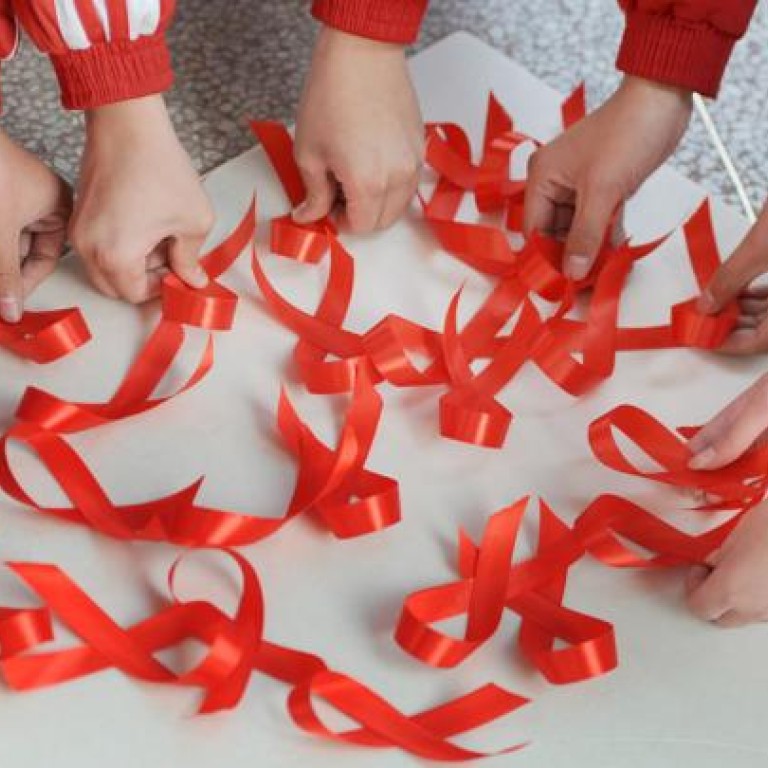
Volunteer doctors give hope to mainland HIV/Aids patients
A group of doctors in Nanjing has volunteered to provide medical care to HIV/Aids patients who are shunned by mainland hospitals when awaiting surgery.

Zhang Huilin , a 33-year-old gynaecologist at Nanjing Maternity and Child Health Care Hospital, was one of the first doctors to sign up for the group.
"We learned that HIV/Aids patients have difficulty accessing medical care and that they get turned down a lot of times, so they sometimes withhold their HIV condition," Zhang said. "This volunteer group was established to solve the problem.
"We know that in reality the law on the prevention and control of HIV/Aids and administrative orders that forbid medical institutions from denying treatment to patients with HIV/Aids do not always work, so this loosely organised group of volunteers can bypass the flaws in the system and get problems solved."
To mark World Aids Day today, Communist Party general secretary Xi Jinping visited a clinic and a community care centre for Aids patients yesterday to show his support for HIV/Aids victims.
"Aids is not scary. What is scary is the bias and discrimination [against HIV/Aids patients] … Aids patients are just like our brothers and sisters," he was cited by CCTV as telling patients and volunteers.
Premier Wen Jiabao also held a meeting with Aids patients and activists in Zhongnanhai, the leadership compound in Beijing, and highlighted his support of HIV/Aids patients during his 10 years in office.
But the government's drive to fight the disease has not been able to remove the stigma attached to HIV/Aids patients on the mainland and they are frequently denied medical care once their HIV status is revealed.
Some patients choose to withhold the information, like a Tianjin patient with lung cancer who was turned away by a number of hospitals and only managed to have his tumour removed after forging his medical records to delete mention of his HIV status. His case caused public uproar and attracted the attention of Politburo Standing Committee member Li Keqiang , who will succeed Wen as premier in March.
Another of the Sunshine Doctors, Guan Wenhui , a dermatologist with Jiangsu's Centre for Disease Prevention and Control, said that although he understood why patients chose to withhold information, they should not do so because even in simple operations such as an appendectomy there were still risks of HIV transmission. Telling doctors about their HIV status would also save them time in figuring out the reason for their low immune response and result in better treatment.
Guan said mainlanders had had a phobia about hepatitis B for decades but the situation had improved greatly. He said doctors wanted the public to understand that Aids patients should be regarded like hepatitis B patients.
"Just deal with it like any other chronic infectious disease," Guan said.
Guan said he doubted that any doctor really discriminated against HIV/Aids patients, but the public's lack of knowledge about Aids and unreasonable fear of the disease might see a general hospital turn away an HIV/Aids patient. For example, other patients might not want to share a ward with an Aids patient even though they could not contract the virus by staying in the same room, Guan said.
Zhang's wife is also a doctor and supports his work, but he said he had concerns too, because he would not be able to work as a doctor if he contracted the virus.
"I totally understand the risk of contracting Aids because there are a lot of cases of being cut by the scalpel and stung by the needle, but if nobody does it who will operate on those HIV/Aids patients?" he said.
"They are already marginalised because of their disease and if they are deprived of their rights to medical care their hatred of general society will mount. It's unfair and very dangerous to society."
Zhang's patients call him when they cannot get the medical service they need in hospitals designated to treat HIV/Aids patients. When surgery is required, doctors will contact the health authorities and find an operating theatre and nurses willing to help with the operation.
However, he said most of the time he actually just offered support and comfort to the patients, because they hardly ever got it elsewhere.
"They feel like it's the end of the world when there is something wrong with their body but I tell them that nowadays HIV is not a death sentence and they can still have a long life if they detect the disease early and intervene early," Zhang said.
"Sometimes I feel they just want listening ears. They feel they don't have anyone else to talk to, that others will not understand."

